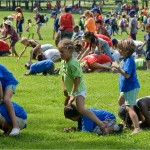Nancy Saraiva
There’s a trend making its way back into the world of parenting. The trend is good old fashioned play. According to the BC Ministry of Education, play is so important that its significance in children’s lives is recognized by the United Nations as a specific right.
Play has been turned upside down from the days when kids would be out playing kick the can or street hockey or making forts at the neighbourhood park, to today, where more often than not, play refers to something that involves a child sitting in front of a screen. Scheduled lives have become the norm as parents chauffeur their kids from activity to activity hoping their kids will develop into the next child prodigy.
So what happened to play and how do parents allow kids to just…play? The first step is to understand the benefits play has in child development. BC’s Early Learning Framework states that in playing, children express, explore, combine, and extend what they have learned about the sights, sounds, smells, and textures of the world around them; and about their own and other people’s thoughts, feelings, ideas, and sensations.
“Strong social skills, a rich imagination and an increased capacity for problem solving and creative thinking are among the typical traits I would connect with children who have regular opportunities for unstructured play with their peers,” says Erika Warkentin, a New Westminster kindergarten teacher.
Upon dissection, it’s easy to see the underlying benefits of free play. With role playing exercises, children learn to consider other people’s perspectives, learn to develop self-control and they develop their negotiating skills in planning. Simple games with blocks and toys enhance brain and motor development. Dress-up play nurtures children’s imagination and social skills.
“Children start life with an incredible capacity for being creative and it is wonderful to observe the children who have had regular opportunities to nurture and develop these skills,” continues Warkentin.
Though there are benefits to the structured classes, it’s important to find a healthy balance and ensure that play is scheduled into their daily lives. Stepping out of ‘adult life’ and into imaginative play is a great opportunity to bond and it’s a tried and true de-stressor. Unstructured play gives adults a wonderful window to peek in and watch the creativity brewing in their little heads. Besides, Mister Rogers wouldn’t lie when he said, “Play is often talked about as if it were a relief from serious learning. But for children, play is serious learning. Play is really the work of childhood.”
